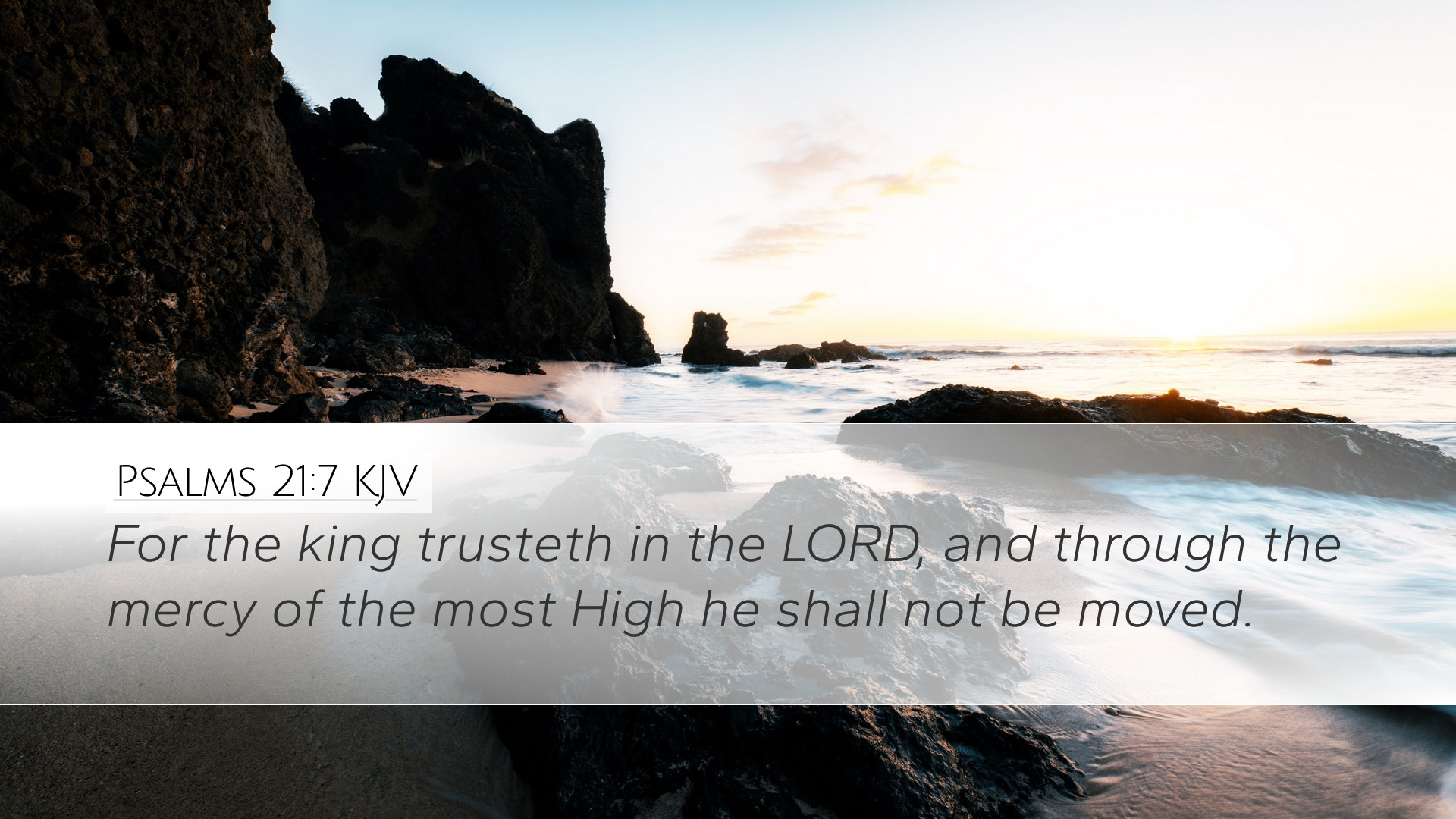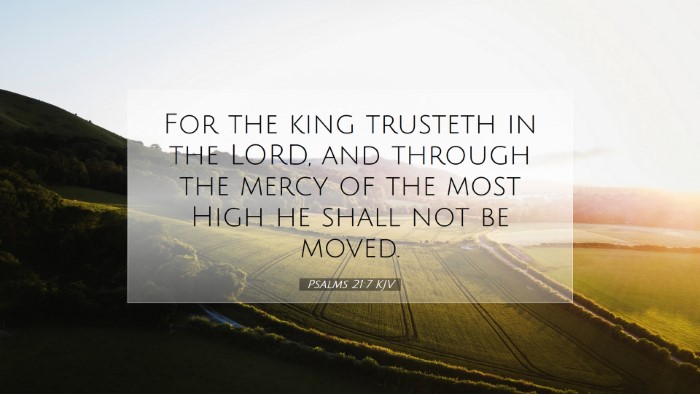Psalms 21:7 Commentary
Bible Verse: "For the king trusts in the LORD, and through the steadfast love of the Most High he shall not be moved." (Psalms 21:7)
Introduction
This verse encapsulates the profound relationship between a king and his reliance upon God. It presents themes of faith, divine support, and unwavering love from God—the Most High. To fully appreciate the depth of this verse, we will explore insights from various public domain commentaries, delving into its theological implications and practical applications for leaders, believers, and scholars alike.
Trust in the Lord
Matthew Henry's Insights: Henry emphasizes that the foundation of a king's rule is his trust in the Lord. A righteous king acknowledges that his throne is a divine appointment and that his success is contingent upon his relationship with God. This trust reflects a broader theme in the scriptures about the necessity of dependence on divine wisdom and strength in leadership.
Albert Barnes' Perspective: Barnes elaborates that the king's trust signifies a profound faith that transcends human abilities. In his commentary, he notes that the reliance on God not only provides a sense of security in governance but also aligns the leader’s priorities with divine will. He suggests that such trust inspires confidence in the people, fostering a society rooted in faith rather than fear.
Adam Clarke's View: Clarke brings attention to the nature of this trust as not merely passive. He describes it as an active commitment to faithfulness and obedience to divine commands. For him, this verse calls leaders to align their actions with God's guidance, illustrating that true strength arises from divine support rather than mere human effort.
Steadfast Love of the Most High
Theological Significance: The term 'steadfast love' reflects God's covenant faithfulness. It signifies a love that endures, models of which are found throughout the Old Testament, particularly in the relationship between God and His chosen people. This love serves as the foundation upon which the king can stand firm in times of turmoil.
Henry's Analysis: Henry notes that God's steadfast love is the assurance that undergirds the king's heart. It is through this love that the king can maintain his position without being shaken. The phrase highlights God’s unchanging nature; thus, the ruler's stability is a manifestation of divine assurance.
Barnes on Divine Support: Barnes reflects on the implications of God's love as a protective force that surrounds the king. This divine affection is not only comforting but also empowering, equipping the king to navigate challenges. The assurance that God will support him fosters resilience.
Clarke's Emphasis: For Clarke, the steadfast love of God illustrates a relational dynamic that calls for the leader to reciprocate this love through faithfulness. He elucidates that understanding God's love is transformative, encouraging leaders to act with integrity and compassion at all times.
Implications for Leadership
This verse admonishes leaders to foster a reliance on God that surpasses political machinations and personal ambitions. Faithful leadership, as reflected in the Psalms, is characterized by
- **Trust in Divine Guidance:** Leaders must seek God’s wisdom in decisions.
- **Modeling Integrity:** A king’s life should reflect the values and principles of godly leadership.
- **Seeking Support from the Community of Faith:** Leaders are encouraged to build a community that upholds and surrounds them with prayer and support.
Personal Application
For pastors, theologians, and students of the Word, Psalms 21:7 offers profound personal applications:
- Encouragement in Leadership: The verse reassures leaders that their strength and support come from God’s love, encouraging them to trust in His plans.
- Reflection on God's Love: Individuals may reflect on how God’s steadfast love has been evident in their lives, reinforcing their trust in Him.
- Communal Prayer:** Emphasizing the importance of collective faith, this verse encourages congregations to pray for their leaders, that they remain anchored in God.
Conclusion
Psalms 21:7 serves as an important reminder of the divine foundation upon which leaders must build their lives and ministries. The king’s trust in the LORD underscores a principle applicable to all believers: our identity and stability are rooted in our relationship with God. As we engage with this verse, let us strive to embody the steadfast trust and love that God extends to us, ultimately impacting our communities for His glory.


